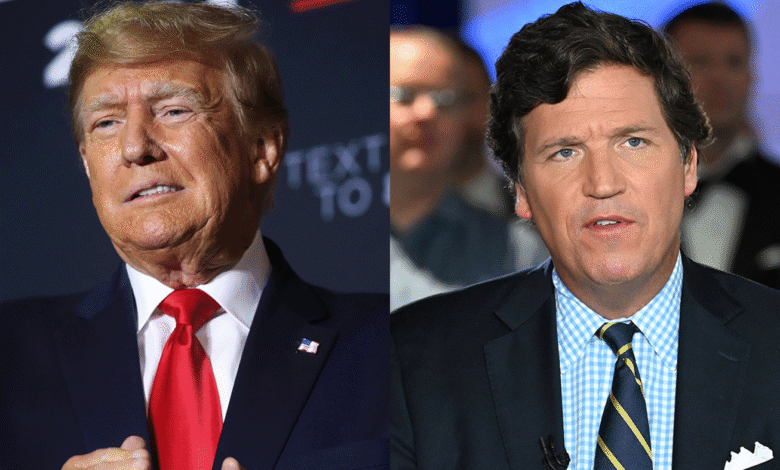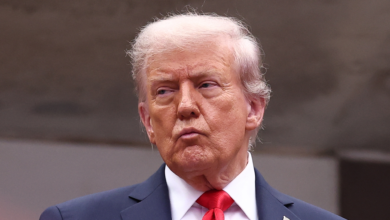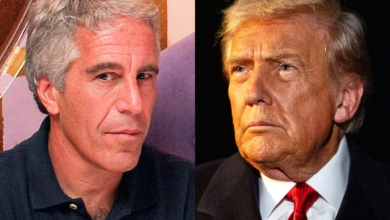Trump Is Suddenly Raging at Tucker Carlson—and MAGA Is Deeply Rattled
Is opposition to “forever wars” really a core pillar of MAGA Republicanism? Looks like we’re about to find out.

You may have heard that Donald Trump’s victory in the 2024 election was partly due to his promise to end the “forever wars.” During his campaign, Trump sharply criticized Democratic candidate Kamala Harris for campaigning with Liz Cheney and criticized her for wanting “a war with every Muslim country known to mankind.” The media naively insisted that this anger over military interventions in Iraq and Afghanistan fueled Trump’s “movement.” Some even suggested that it was war fatigue, not his deep affection for Vladimir Putin, that motivated his opposition to arming Ukraine.
A new battle between Trump and Tucker Carlson over Israel’s war against Iran severely challenges this understanding of the “MAGA” movement. Carlson and Steve Bannon, among others, urged Trump not to deploy the US military in collaboration with Israel. Trump seems ready to do so, and figures like Carlson and Bannon are loudly declaring that it would betray the “MAGA” movement, which, in turn, infuriates Trump.
“Someone explain to that nutcase Tucker Carlson that Iran can’t have a nuclear weapon!” Trump blasted on Truth Social Monday night. He also expressed his displeasure to reporters: “I don’t understand what Tucker Carlson is saying.”
Trump was particularly angered by Carlson’s sudden and direct criticism of him regarding the hostilities between Israel and Iran. Carlson claimed that Trump was “complicit” in this war, apparently because of his support for Israeli strikes against Iranian nuclear facilities and senior military leaders. Trump is currently considering deploying American B-2 bombers to help destroy Iran’s Fordow nuclear enrichment facility, which would draw the United States into a Middle Eastern conflict very similar to the one he has vowed to avoid.
All of this has caused a deep rift within the “MAGA” coalition. Carlson denounced Fox News personalities like Sean Hannity, who actively encouraged Trump to seek “direct US military intervention” abroad, calling them “warmongers.” In an online debate, Carlson and Bannon argued that this risked alienating supporters who want to “end the forever wars,” describing them as essential to the “MAGA” coalition. MAGA supporters like Matt Gaetz and Marjorie Taylor Greene appeared irritated as they urged Trump not to abandon the MAGA here.
But how genuine is the anti-war sentiment within the MAGA movement?
Here’s a test: Republican Rep. Thomas Massie introduced a House resolution on Tuesday prohibiting Trump from going to war with Iran without explicit congressional authorization. Co-sponsored by Democratic Rep. Ro Khanna, this “special” measure will pass if it isn’t blocked by House Speaker Mike Johnson.
Whether the legislative mechanism used by this measure is binding on the president is a matter of debate (and Trump would veto any binding measure). But a vote would require members to sign up, and a general statement of opposition to war without authorization would send a strong message that the MAGA movement sincerely wants him to resist foreign intervention.
“This is a test of how anti-war the MAGA movement is,” Khanna told me.
Theoretically, a coalition of Republicans and Democrats should support such a resolution. Many progressives have long wanted Congress to stop ceding its war powers to presidents. Some (including me) opposed Barack Obama’s attempts to seize these powers at the time.
Moreover, many Democrats oppose war with Iran. As Matt Duss argues, Trump helped pave the way for this moment by withdrawing from the 2015 US-Iran nuclear deal; our intelligence agencies failed to assess Iran’s decision to develop nuclear weapons; and rushing into war now would be illegal and would further destabilize the Middle East.
Prominent Democratic officials share a similar view, and several have co-sponsored the Massie resolution. Meanwhile, Senator Tim Kaine has introduced a similar resolution in the House.
Khanna estimates that all but about 20 Democrats will support the House measure, and he hopes to significantly limit the number of dissenters (a Senate Democratic aide also expects the Kaine resolution to attract dissenters). As Khanna explained to me, this is a bipartisan test, essentially to determine whether “we will ever have an anti-war party in America.”
So it will take Republicans. But how many self-described MAGA Republicans will show up?
There are reasons to be skeptical. Zack Beauchamp has convincingly demonstrated that Trump’s “anti-war” appeal is based on a profound misunderstanding. While Trump has not launched major wars, he favors targeted but highly aggressive military violence, which he sees as serving narrow US (or even his own) interests. During his first term, Trump relaxed rules on drone strikes and other protections against civilian casualties, leading to a sharp rise in tensions on both sides.
At the same time, some equate Trump’s hostility to the postwar liberal international order with “isolationism,” which rules out foreign military intervention. But as Nicholas Grossman points out, this does not reflect a principled opposition to military action. It reflects Trump’s desire to dismantle the Western alliance and curry favor with authoritarians who equally detest it, while undermining multilateralism in general and any other international framework he might consider restrictive for the United States—and for himself.
Some also mistake Trump’s hatred of the deep state for a pacifist attitude. Yet, Trump despises the deep state because he has tried to hold it accountable for its transgressions, and because a professional civil service is an obstacle to unfettered authoritarian rule, not because it is a hotbed of war.
We can observe this reality in the battle between Trump and Carlson: Carlson loudly asserts to Trump that the deep state is trapping him and pushing him to go to war with Iran: shouldn’t Trump be wary of the deep state enemies trying to bring him down? But Trump is now attacking Carlson, not the deep state. One becomes Trump’s enemy not when one actively opposes a principle he is supposed to uphold, but when one publicly criticizes him, holds him accountable, fails to sufficiently glorify his glory, or otherwise becomes a nuisance.
The search for a resolution to rein in Trump also highlights another motivation of the “MAGA” movement, one that contradicts the false “antiwar” claim: its desire to see Trump wield near-absolute power, forcibly directing the pure and unified will of the people (i.e., the will of “MAGA”) like a historical Caesar, free from petty parliamentary indiscretions. It’s hard to imagine how the “MAGA” movement would support restrictions on its war powers or any other measure that threatens to dilute its aura of “strength.”
But guess what? MAGA Republicans can prove all this wrong, by supporting the resolution reasserting congressional control over warmaking authority, geared toward accomplishing what MAGA itself claims to be for: fewer “forever wars” abroad.
Many Republicans in Congress, who have already ceded so much power to Trump, are unlikely to do such a thing. Trump demonstrated precisely what “MAGA” means when he tweeted:
AMERICA FIRST means many GREAT things, including the fact that, IRAN CAN NOT HAVE A NUCLEAR WEAPON. MAKE AMERICA GREAT AGAIN!!!
In other words, Trump grasps that “America First,” or MAGA, is simply whatever he says it is at any given time. And here it may mean enthusiastically backing war with Iran. Will MAGA robotically go along? We’ll soon find out.







